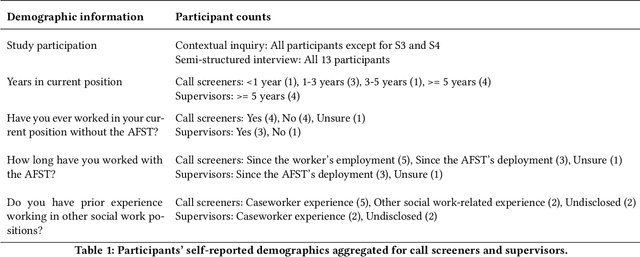Yanghuidi Cheng
Training Towards Critical Use: Learning to Situate AI Predictions Relative to Human Knowledge
Aug 30, 2023



Abstract:A growing body of research has explored how to support humans in making better use of AI-based decision support, including via training and onboarding. Existing research has focused on decision-making tasks where it is possible to evaluate "appropriate reliance" by comparing each decision against a ground truth label that cleanly maps to both the AI's predictive target and the human decision-maker's goals. However, this assumption does not hold in many real-world settings where AI tools are deployed today (e.g., social work, criminal justice, and healthcare). In this paper, we introduce a process-oriented notion of appropriate reliance called critical use that centers the human's ability to situate AI predictions against knowledge that is uniquely available to them but unavailable to the AI model. To explore how training can support critical use, we conduct a randomized online experiment in a complex social decision-making setting: child maltreatment screening. We find that, by providing participants with accelerated, low-stakes opportunities to practice AI-assisted decision-making in this setting, novices came to exhibit patterns of disagreement with AI that resemble those of experienced workers. A qualitative examination of participants' explanations for their AI-assisted decisions revealed that they drew upon qualitative case narratives, to which the AI model did not have access, to learn when (not) to rely on AI predictions. Our findings open new questions for the study and design of training for real-world AI-assisted decision-making.
Toward Supporting Perceptual Complementarity in Human-AI Collaboration via Reflection on Unobservables
Jul 28, 2022



Abstract:In many real world contexts, successful human-AI collaboration requires humans to productively integrate complementary sources of information into AI-informed decisions. However, in practice human decision-makers often lack understanding of what information an AI model has access to in relation to themselves. There are few available guidelines regarding how to effectively communicate about unobservables: features that may influence the outcome, but which are unavailable to the model. In this work, we conducted an online experiment to understand whether and how explicitly communicating potentially relevant unobservables influences how people integrate model outputs and unobservables when making predictions. Our findings indicate that presenting prompts about unobservables can change how humans integrate model outputs and unobservables, but do not necessarily lead to improved performance. Furthermore, the impacts of these prompts can vary depending on decision-makers' prior domain expertise. We conclude by discussing implications for future research and design of AI-based decision support tools.
Improving Human-AI Partnerships in Child Welfare: Understanding Worker Practices, Challenges, and Desires for Algorithmic Decision Support
Apr 05, 2022

Abstract:AI-based decision support tools (ADS) are increasingly used to augment human decision-making in high-stakes, social contexts. As public sector agencies begin to adopt ADS, it is critical that we understand workers' experiences with these systems in practice. In this paper, we present findings from a series of interviews and contextual inquiries at a child welfare agency, to understand how they currently make AI-assisted child maltreatment screening decisions. Overall, we observe how workers' reliance upon the ADS is guided by (1) their knowledge of rich, contextual information beyond what the AI model captures, (2) their beliefs about the ADS's capabilities and limitations relative to their own, (3) organizational pressures and incentives around the use of the ADS, and (4) awareness of misalignments between algorithmic predictions and their own decision-making objectives. Drawing upon these findings, we discuss design implications towards supporting more effective human-AI decision-making.
 Add to Chrome
Add to Chrome Add to Firefox
Add to Firefox Add to Edge
Add to Edge